Charles Sturt Uni: Driverless Trucks and Ethical Theories Analysis
VerifiedAdded on 2021/05/31
|7
|1709
|31
Report
AI Summary
This report examines the ethical implications of driverless trucks, focusing on their potential impact on the Australian workforce. The report begins with an introduction to the case study, highlighting the concerns surrounding job displacement due to automation. It then delves into four key ethical theories: utilitarianism, deontology, virtue theory, and contract theory. Each theory is applied to the case, analyzing the potential benefits and harms of driverless trucks from different perspectives. Utilitarianism considers the overall happiness and well-being, deontology emphasizes moral duties and obligations, virtue theory focuses on character and virtues, and contract theory examines rights and agreements. The report references relevant literature to support its analysis and concludes by summarizing the key findings and offering insights into the ethical complexities of the issue. The analysis underscores the importance of considering multiple ethical frameworks when evaluating the impact of technological advancements on society.
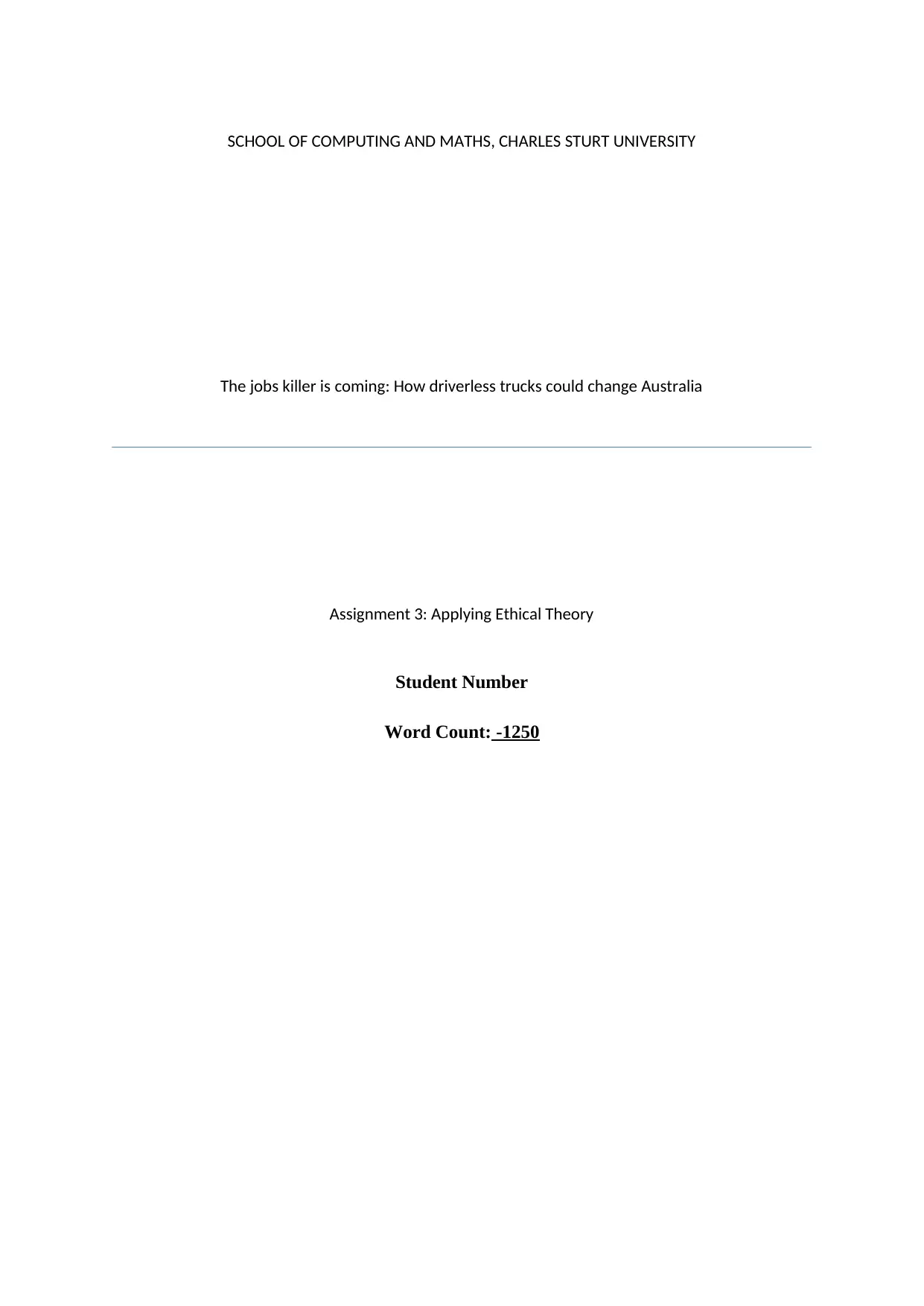
SCHOOL OF COMPUTING AND MATHS, CHARLES STURT UNIVERSITY
The jobs killer is coming: How driverless trucks could change Australia
Assignment 3: Applying Ethical Theory
Student Number
Word Count: -1250
The jobs killer is coming: How driverless trucks could change Australia
Assignment 3: Applying Ethical Theory
Student Number
Word Count: -1250
Paraphrase This Document
Need a fresh take? Get an instant paraphrase of this document with our AI Paraphraser
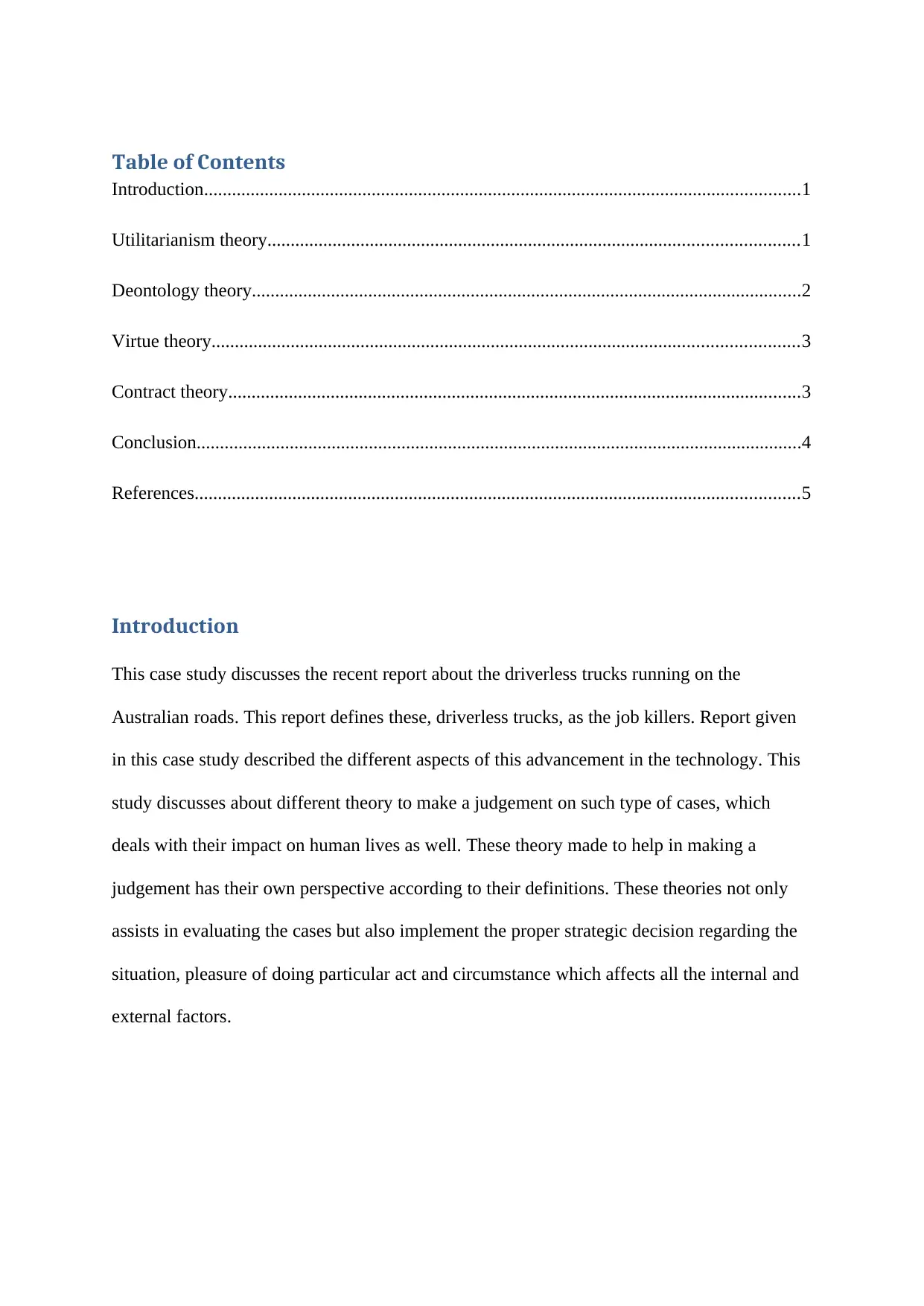
Table of Contents
Introduction................................................................................................................................1
Utilitarianism theory..................................................................................................................1
Deontology theory......................................................................................................................2
Virtue theory..............................................................................................................................3
Contract theory...........................................................................................................................3
Conclusion..................................................................................................................................4
References..................................................................................................................................5
Introduction
This case study discusses the recent report about the driverless trucks running on the
Australian roads. This report defines these, driverless trucks, as the job killers. Report given
in this case study described the different aspects of this advancement in the technology. This
study discusses about different theory to make a judgement on such type of cases, which
deals with their impact on human lives as well. These theory made to help in making a
judgement has their own perspective according to their definitions. These theories not only
assists in evaluating the cases but also implement the proper strategic decision regarding the
situation, pleasure of doing particular act and circumstance which affects all the internal and
external factors.
Introduction................................................................................................................................1
Utilitarianism theory..................................................................................................................1
Deontology theory......................................................................................................................2
Virtue theory..............................................................................................................................3
Contract theory...........................................................................................................................3
Conclusion..................................................................................................................................4
References..................................................................................................................................5
Introduction
This case study discusses the recent report about the driverless trucks running on the
Australian roads. This report defines these, driverless trucks, as the job killers. Report given
in this case study described the different aspects of this advancement in the technology. This
study discusses about different theory to make a judgement on such type of cases, which
deals with their impact on human lives as well. These theory made to help in making a
judgement has their own perspective according to their definitions. These theories not only
assists in evaluating the cases but also implement the proper strategic decision regarding the
situation, pleasure of doing particular act and circumstance which affects all the internal and
external factors.
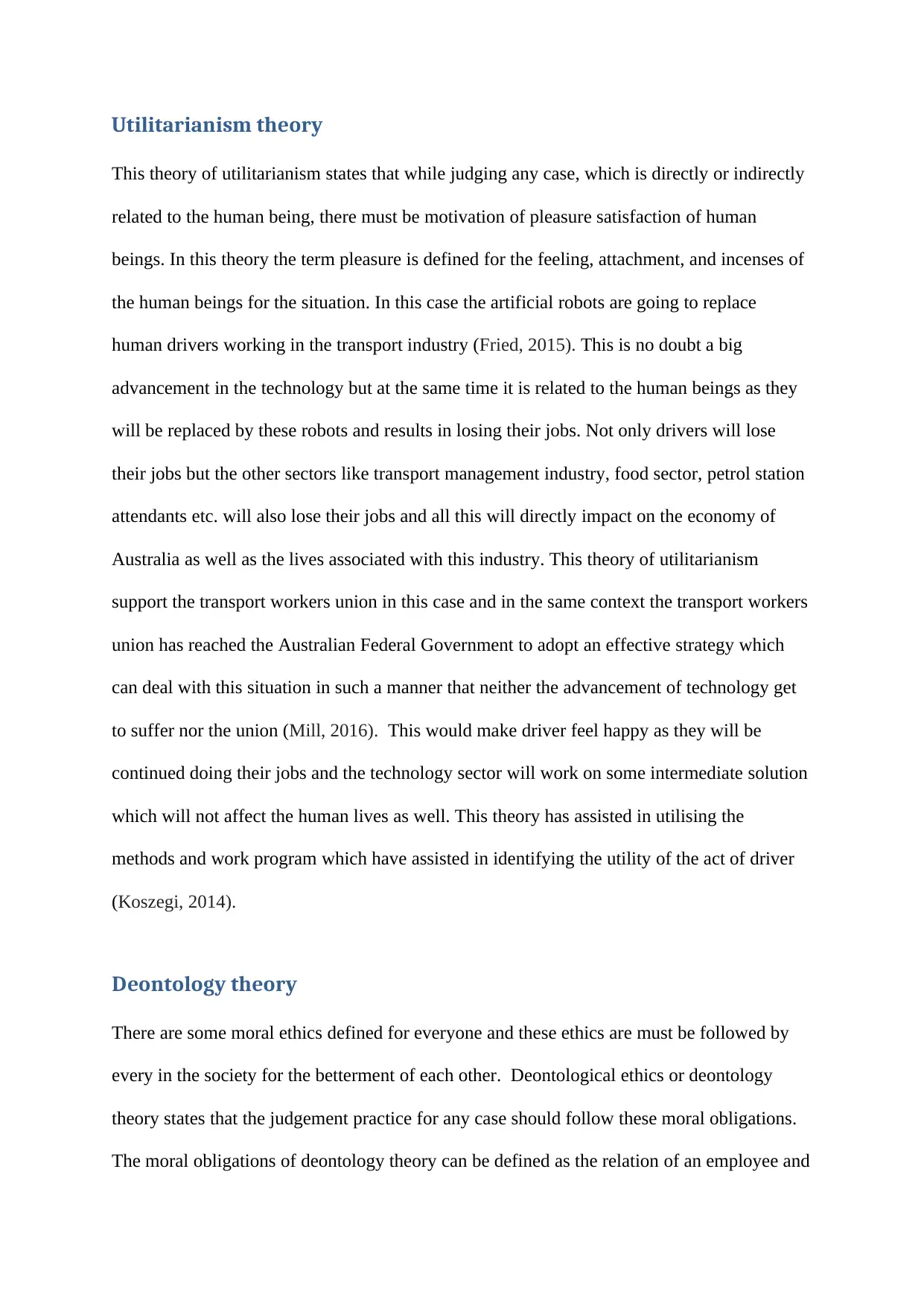
Utilitarianism theory
This theory of utilitarianism states that while judging any case, which is directly or indirectly
related to the human being, there must be motivation of pleasure satisfaction of human
beings. In this theory the term pleasure is defined for the feeling, attachment, and incenses of
the human beings for the situation. In this case the artificial robots are going to replace
human drivers working in the transport industry (Fried, 2015). This is no doubt a big
advancement in the technology but at the same time it is related to the human beings as they
will be replaced by these robots and results in losing their jobs. Not only drivers will lose
their jobs but the other sectors like transport management industry, food sector, petrol station
attendants etc. will also lose their jobs and all this will directly impact on the economy of
Australia as well as the lives associated with this industry. This theory of utilitarianism
support the transport workers union in this case and in the same context the transport workers
union has reached the Australian Federal Government to adopt an effective strategy which
can deal with this situation in such a manner that neither the advancement of technology get
to suffer nor the union (Mill, 2016). This would make driver feel happy as they will be
continued doing their jobs and the technology sector will work on some intermediate solution
which will not affect the human lives as well. This theory has assisted in utilising the
methods and work program which have assisted in identifying the utility of the act of driver
(Koszegi, 2014).
Deontology theory
There are some moral ethics defined for everyone and these ethics are must be followed by
every in the society for the betterment of each other. Deontological ethics or deontology
theory states that the judgement practice for any case should follow these moral obligations.
The moral obligations of deontology theory can be defined as the relation of an employee and
This theory of utilitarianism states that while judging any case, which is directly or indirectly
related to the human being, there must be motivation of pleasure satisfaction of human
beings. In this theory the term pleasure is defined for the feeling, attachment, and incenses of
the human beings for the situation. In this case the artificial robots are going to replace
human drivers working in the transport industry (Fried, 2015). This is no doubt a big
advancement in the technology but at the same time it is related to the human beings as they
will be replaced by these robots and results in losing their jobs. Not only drivers will lose
their jobs but the other sectors like transport management industry, food sector, petrol station
attendants etc. will also lose their jobs and all this will directly impact on the economy of
Australia as well as the lives associated with this industry. This theory of utilitarianism
support the transport workers union in this case and in the same context the transport workers
union has reached the Australian Federal Government to adopt an effective strategy which
can deal with this situation in such a manner that neither the advancement of technology get
to suffer nor the union (Mill, 2016). This would make driver feel happy as they will be
continued doing their jobs and the technology sector will work on some intermediate solution
which will not affect the human lives as well. This theory has assisted in utilising the
methods and work program which have assisted in identifying the utility of the act of driver
(Koszegi, 2014).
Deontology theory
There are some moral ethics defined for everyone and these ethics are must be followed by
every in the society for the betterment of each other. Deontological ethics or deontology
theory states that the judgement practice for any case should follow these moral obligations.
The moral obligations of deontology theory can be defined as the relation of an employee and
⊘ This is a preview!⊘
Do you want full access?
Subscribe today to unlock all pages.

Trusted by 1+ million students worldwide
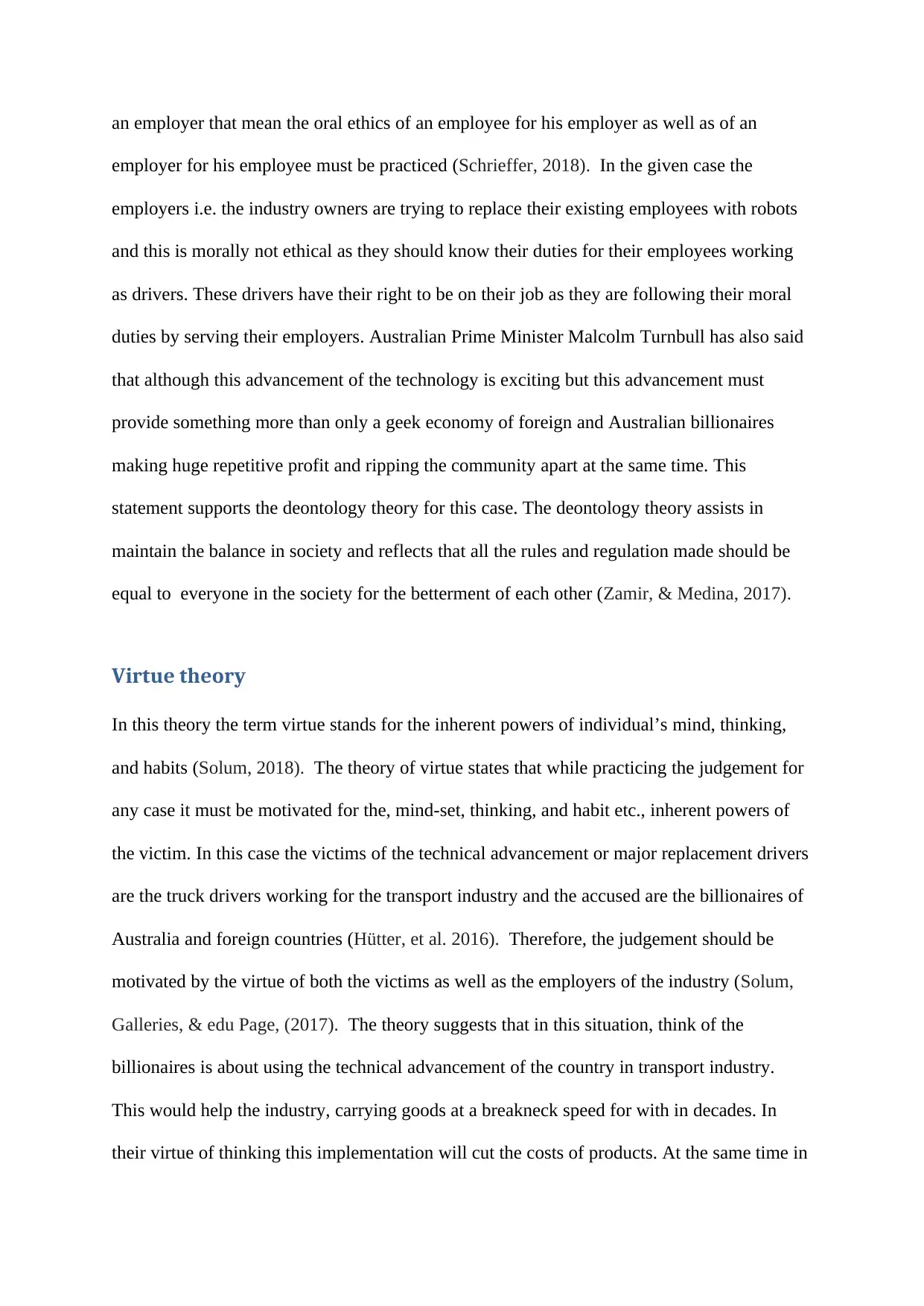
an employer that mean the oral ethics of an employee for his employer as well as of an
employer for his employee must be practiced (Schrieffer, 2018). In the given case the
employers i.e. the industry owners are trying to replace their existing employees with robots
and this is morally not ethical as they should know their duties for their employees working
as drivers. These drivers have their right to be on their job as they are following their moral
duties by serving their employers. Australian Prime Minister Malcolm Turnbull has also said
that although this advancement of the technology is exciting but this advancement must
provide something more than only a geek economy of foreign and Australian billionaires
making huge repetitive profit and ripping the community apart at the same time. This
statement supports the deontology theory for this case. The deontology theory assists in
maintain the balance in society and reflects that all the rules and regulation made should be
equal to everyone in the society for the betterment of each other (Zamir, & Medina, 2017).
Virtue theory
In this theory the term virtue stands for the inherent powers of individual’s mind, thinking,
and habits (Solum, 2018). The theory of virtue states that while practicing the judgement for
any case it must be motivated for the, mind-set, thinking, and habit etc., inherent powers of
the victim. In this case the victims of the technical advancement or major replacement drivers
are the truck drivers working for the transport industry and the accused are the billionaires of
Australia and foreign countries (Hütter, et al. 2016). Therefore, the judgement should be
motivated by the virtue of both the victims as well as the employers of the industry (Solum,
Galleries, & edu Page, (2017). The theory suggests that in this situation, think of the
billionaires is about using the technical advancement of the country in transport industry.
This would help the industry, carrying goods at a breakneck speed for with in decades. In
their virtue of thinking this implementation will cut the costs of products. At the same time in
employer for his employee must be practiced (Schrieffer, 2018). In the given case the
employers i.e. the industry owners are trying to replace their existing employees with robots
and this is morally not ethical as they should know their duties for their employees working
as drivers. These drivers have their right to be on their job as they are following their moral
duties by serving their employers. Australian Prime Minister Malcolm Turnbull has also said
that although this advancement of the technology is exciting but this advancement must
provide something more than only a geek economy of foreign and Australian billionaires
making huge repetitive profit and ripping the community apart at the same time. This
statement supports the deontology theory for this case. The deontology theory assists in
maintain the balance in society and reflects that all the rules and regulation made should be
equal to everyone in the society for the betterment of each other (Zamir, & Medina, 2017).
Virtue theory
In this theory the term virtue stands for the inherent powers of individual’s mind, thinking,
and habits (Solum, 2018). The theory of virtue states that while practicing the judgement for
any case it must be motivated for the, mind-set, thinking, and habit etc., inherent powers of
the victim. In this case the victims of the technical advancement or major replacement drivers
are the truck drivers working for the transport industry and the accused are the billionaires of
Australia and foreign countries (Hütter, et al. 2016). Therefore, the judgement should be
motivated by the virtue of both the victims as well as the employers of the industry (Solum,
Galleries, & edu Page, (2017). The theory suggests that in this situation, think of the
billionaires is about using the technical advancement of the country in transport industry.
This would help the industry, carrying goods at a breakneck speed for with in decades. In
their virtue of thinking this implementation will cut the costs of products. At the same time in
Paraphrase This Document
Need a fresh take? Get an instant paraphrase of this document with our AI Paraphraser
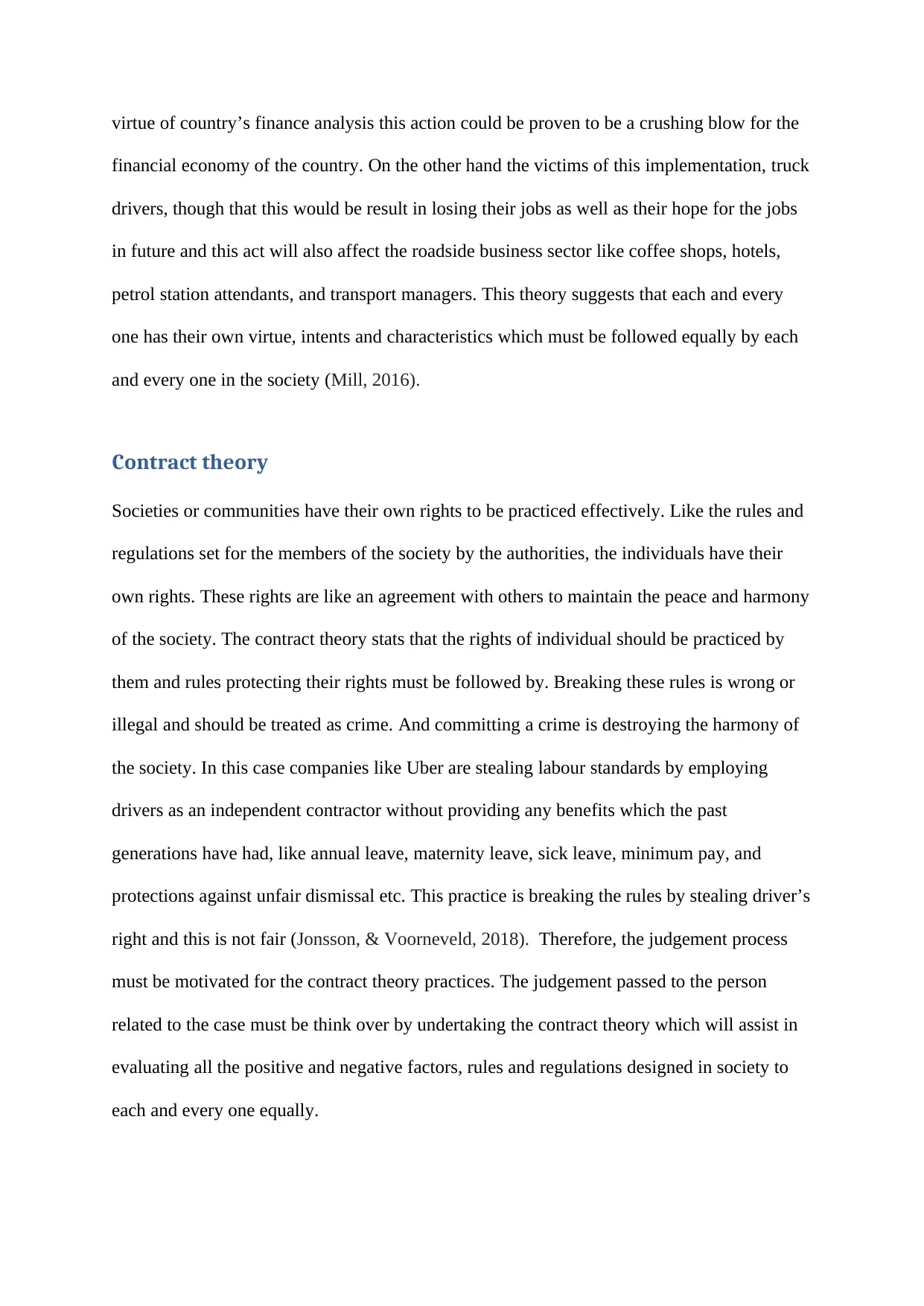
virtue of country’s finance analysis this action could be proven to be a crushing blow for the
financial economy of the country. On the other hand the victims of this implementation, truck
drivers, though that this would be result in losing their jobs as well as their hope for the jobs
in future and this act will also affect the roadside business sector like coffee shops, hotels,
petrol station attendants, and transport managers. This theory suggests that each and every
one has their own virtue, intents and characteristics which must be followed equally by each
and every one in the society (Mill, 2016).
Contract theory
Societies or communities have their own rights to be practiced effectively. Like the rules and
regulations set for the members of the society by the authorities, the individuals have their
own rights. These rights are like an agreement with others to maintain the peace and harmony
of the society. The contract theory stats that the rights of individual should be practiced by
them and rules protecting their rights must be followed by. Breaking these rules is wrong or
illegal and should be treated as crime. And committing a crime is destroying the harmony of
the society. In this case companies like Uber are stealing labour standards by employing
drivers as an independent contractor without providing any benefits which the past
generations have had, like annual leave, maternity leave, sick leave, minimum pay, and
protections against unfair dismissal etc. This practice is breaking the rules by stealing driver’s
right and this is not fair (Jonsson, & Voorneveld, 2018). Therefore, the judgement process
must be motivated for the contract theory practices. The judgement passed to the person
related to the case must be think over by undertaking the contract theory which will assist in
evaluating all the positive and negative factors, rules and regulations designed in society to
each and every one equally.
financial economy of the country. On the other hand the victims of this implementation, truck
drivers, though that this would be result in losing their jobs as well as their hope for the jobs
in future and this act will also affect the roadside business sector like coffee shops, hotels,
petrol station attendants, and transport managers. This theory suggests that each and every
one has their own virtue, intents and characteristics which must be followed equally by each
and every one in the society (Mill, 2016).
Contract theory
Societies or communities have their own rights to be practiced effectively. Like the rules and
regulations set for the members of the society by the authorities, the individuals have their
own rights. These rights are like an agreement with others to maintain the peace and harmony
of the society. The contract theory stats that the rights of individual should be practiced by
them and rules protecting their rights must be followed by. Breaking these rules is wrong or
illegal and should be treated as crime. And committing a crime is destroying the harmony of
the society. In this case companies like Uber are stealing labour standards by employing
drivers as an independent contractor without providing any benefits which the past
generations have had, like annual leave, maternity leave, sick leave, minimum pay, and
protections against unfair dismissal etc. This practice is breaking the rules by stealing driver’s
right and this is not fair (Jonsson, & Voorneveld, 2018). Therefore, the judgement process
must be motivated for the contract theory practices. The judgement passed to the person
related to the case must be think over by undertaking the contract theory which will assist in
evaluating all the positive and negative factors, rules and regulations designed in society to
each and every one equally.
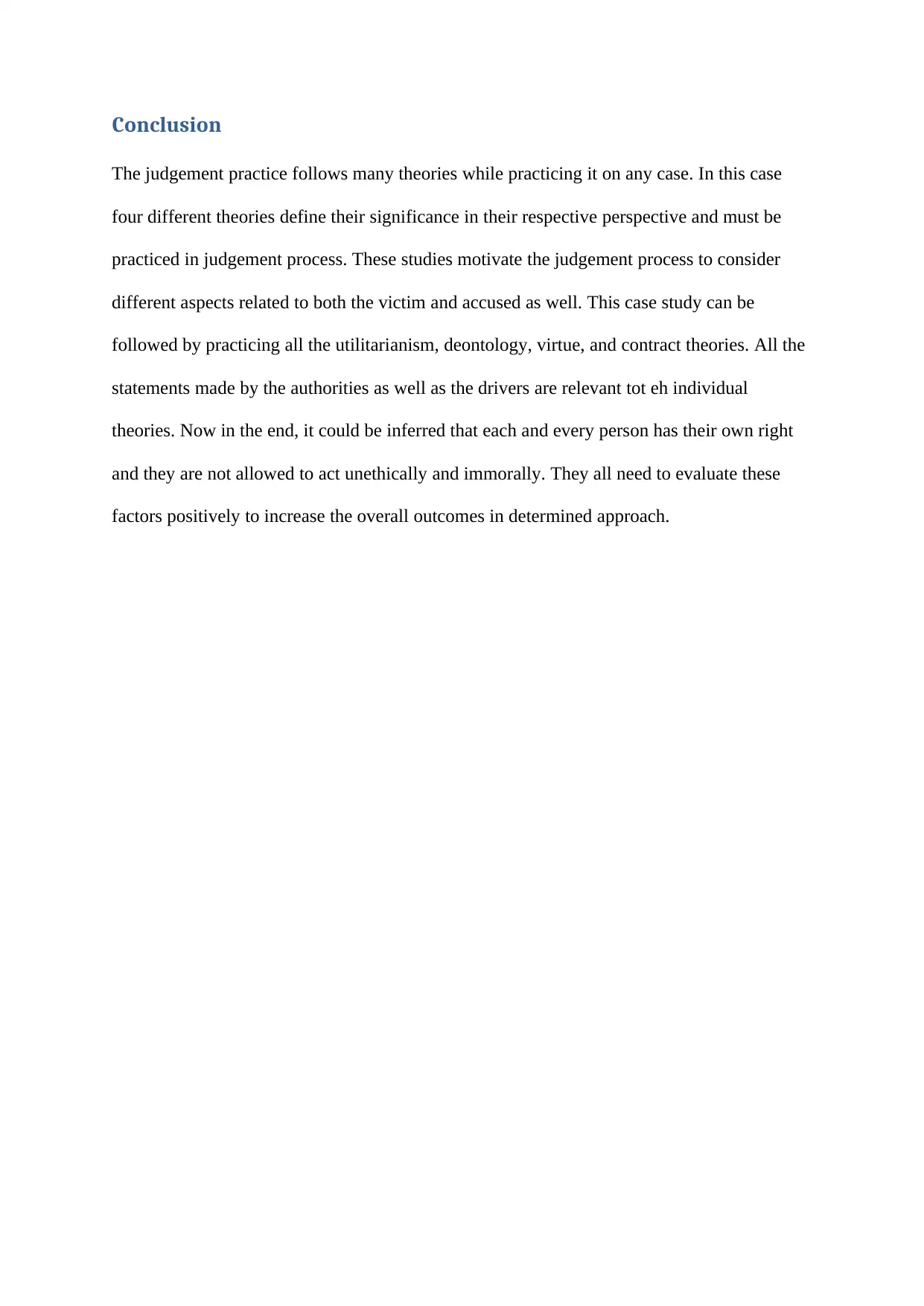
Conclusion
The judgement practice follows many theories while practicing it on any case. In this case
four different theories define their significance in their respective perspective and must be
practiced in judgement process. These studies motivate the judgement process to consider
different aspects related to both the victim and accused as well. This case study can be
followed by practicing all the utilitarianism, deontology, virtue, and contract theories. All the
statements made by the authorities as well as the drivers are relevant tot eh individual
theories. Now in the end, it could be inferred that each and every person has their own right
and they are not allowed to act unethically and immorally. They all need to evaluate these
factors positively to increase the overall outcomes in determined approach.
The judgement practice follows many theories while practicing it on any case. In this case
four different theories define their significance in their respective perspective and must be
practiced in judgement process. These studies motivate the judgement process to consider
different aspects related to both the victim and accused as well. This case study can be
followed by practicing all the utilitarianism, deontology, virtue, and contract theories. All the
statements made by the authorities as well as the drivers are relevant tot eh individual
theories. Now in the end, it could be inferred that each and every person has their own right
and they are not allowed to act unethically and immorally. They all need to evaluate these
factors positively to increase the overall outcomes in determined approach.
⊘ This is a preview!⊘
Do you want full access?
Subscribe today to unlock all pages.

Trusted by 1+ million students worldwide
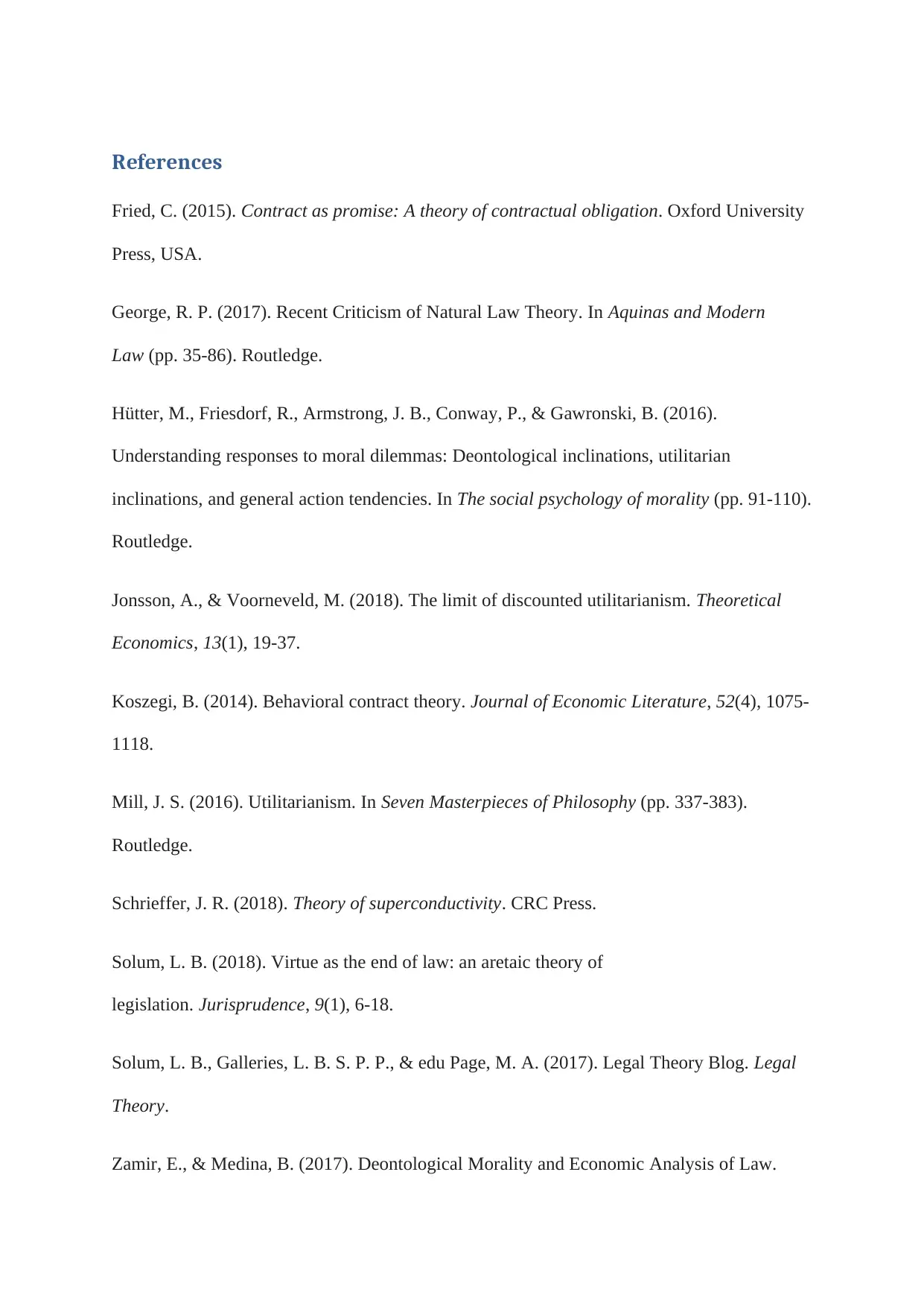
References
Fried, C. (2015). Contract as promise: A theory of contractual obligation. Oxford University
Press, USA.
George, R. P. (2017). Recent Criticism of Natural Law Theory. In Aquinas and Modern
Law (pp. 35-86). Routledge.
Hütter, M., Friesdorf, R., Armstrong, J. B., Conway, P., & Gawronski, B. (2016).
Understanding responses to moral dilemmas: Deontological inclinations, utilitarian
inclinations, and general action tendencies. In The social psychology of morality (pp. 91-110).
Routledge.
Jonsson, A., & Voorneveld, M. (2018). The limit of discounted utilitarianism. Theoretical
Economics, 13(1), 19-37.
Koszegi, B. (2014). Behavioral contract theory. Journal of Economic Literature, 52(4), 1075-
1118.
Mill, J. S. (2016). Utilitarianism. In Seven Masterpieces of Philosophy (pp. 337-383).
Routledge.
Schrieffer, J. R. (2018). Theory of superconductivity. CRC Press.
Solum, L. B. (2018). Virtue as the end of law: an aretaic theory of
legislation. Jurisprudence, 9(1), 6-18.
Solum, L. B., Galleries, L. B. S. P. P., & edu Page, M. A. (2017). Legal Theory Blog. Legal
Theory.
Zamir, E., & Medina, B. (2017). Deontological Morality and Economic Analysis of Law.
Fried, C. (2015). Contract as promise: A theory of contractual obligation. Oxford University
Press, USA.
George, R. P. (2017). Recent Criticism of Natural Law Theory. In Aquinas and Modern
Law (pp. 35-86). Routledge.
Hütter, M., Friesdorf, R., Armstrong, J. B., Conway, P., & Gawronski, B. (2016).
Understanding responses to moral dilemmas: Deontological inclinations, utilitarian
inclinations, and general action tendencies. In The social psychology of morality (pp. 91-110).
Routledge.
Jonsson, A., & Voorneveld, M. (2018). The limit of discounted utilitarianism. Theoretical
Economics, 13(1), 19-37.
Koszegi, B. (2014). Behavioral contract theory. Journal of Economic Literature, 52(4), 1075-
1118.
Mill, J. S. (2016). Utilitarianism. In Seven Masterpieces of Philosophy (pp. 337-383).
Routledge.
Schrieffer, J. R. (2018). Theory of superconductivity. CRC Press.
Solum, L. B. (2018). Virtue as the end of law: an aretaic theory of
legislation. Jurisprudence, 9(1), 6-18.
Solum, L. B., Galleries, L. B. S. P. P., & edu Page, M. A. (2017). Legal Theory Blog. Legal
Theory.
Zamir, E., & Medina, B. (2017). Deontological Morality and Economic Analysis of Law.
1 out of 7
Related Documents
Your All-in-One AI-Powered Toolkit for Academic Success.
+13062052269
info@desklib.com
Available 24*7 on WhatsApp / Email
![[object Object]](/_next/static/media/star-bottom.7253800d.svg)
Unlock your academic potential
Copyright © 2020–2026 A2Z Services. All Rights Reserved. Developed and managed by ZUCOL.





